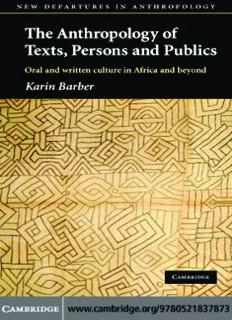
The Anthropology of Texts, Persons and Publics (New Departures in Anthropology) PDF
Preview The Anthropology of Texts, Persons and Publics (New Departures in Anthropology)
This page intentionally left blank the anthropology of texts, persons and publics What can texts – both written and oral – tell us about the societies that producethem?Howaretextsconstitutedindifferentcultures,andhowdo they shape societies and individuals? How can we understand the people who compose them? Drawing on examples from all over the world, this original survey sets out to answer these questions, by exploring textuality from a variety of angles. Topics covered include the importance of genre, thewaysinwhichoralgenrestranscendthehere-and-now,andthecomplex relationship between texts and the material world. It considers the ways inwhichpersonhoodisevoked,bothinoralpoetryandinwrittendiaries and letters, discusses the audience’s role in creating the meaning of texts, andshowstextualcreativitytobeauniversalhumancapacityexpressedin myriadforms.Engagingandthought-provoking,thisbookwillbewelcomed byanyoneinterestedinanthropology,literatureandculturalstudies. KarinBarberisProfessorofAfricanCulturalAnthropologyattheUniversity of Birmingham. Her most recent publications include Africa’s Hidden Histories(2006)andTheGenerationofPlays(2000). new departures in anthropology NewDeparturesinAnthropologyisabookseriesthatfocusesonemerging themesinsocialandculturalanthropology.Withoriginalperspectivesand syntheses,authorsintroducenewareasofinquiryinanthropology,explore developments that cross disciplinary boundaries, and weigh in on current debates.Everybookillustratestheoreticalissueswithethnographicmaterial drawn from current research or classic studies, as well as from literature, memoirs, and other genres of reportage. The aim of the series is to pro- duce books that are accessible enough to be used by college students and instructors,butwillalsostimulate,provokeandinformanthropologistsat allstagesoftheircareers.Writtenclearlyandconcisely,booksintheseries aredesignedequallyforadvancedstudentsandabroaderrangeofreaders, insideandoutsideacademicanthropology,whowanttobebroughtupto dateonthemostexcitingdevelopmentsinthediscipline. Editorialboard JonathanSpencer,UniversityofEdinburgh MichaelLambek,UniversityofToronto SabaMahmood,UniversityofCalifornia,Berkeley OliviaHarris,LondonSchoolofEconomics The Anthropology of Texts, Persons and Publics (cid:1) KARIN BARBER UniversityofBirmingham CAMBRIDGEUNIVERSITYPRESS Cambridge, New York, Melbourne, Madrid, Cape Town, Singapore, São Paulo Cambridge University Press The Edinburgh Building, Cambridge CB28RU, UK Published in the United States of America by Cambridge University Press, New York www.cambridge.org Information on this title: www.cambridge.org/9780521837873 © Karin Barber 2007 This publication is in copyright. Subject to statutory exception and to the provision of relevant collective licensing agreements, no reproduction of any part may take place without the written permission of Cambridge University Press. First published in print format 2007 ISBN-13 978-0-511-37694-8 eBook (EBL) ISBN-13 978-0-521-83787-3 hardback ISBN-13 978-0-521-54687-4 paperback Cambridge University Press has no responsibility for the persistence or accuracy of urls for external or third-party internet websites referred to in this publication, and does not guarantee that any content on such websites is, or will remain, accurate or appropriate. Contents Prefaceandacknowledgements page vii 1 Anthropologyandtext 1 2 Genre,societyandhistory 32 3 Theconstitutionoforaltexts 67 4 Textandpersonhood 103 5 Audiencesandpublics 137 6 Theprivate 175 7 Textualfieldsandpopularcreativity 200 Notes 226 Bibliography 241 Index 265 v Prefaceandacknowledgements Althoughthisbookisshort,itwashardtowrite,andIdeletedmorepages thanIkept. My first degree was in English, and this was at a time when New CriticismreignedsupremeinBritishuniversities.Iwastrainedinwhat Inowthinkwasoneofthemostexactingdisciplinespossible.Eyeballto eyeballwiththe“wordsonthepage”,therewasnoescapeintohistorical generalities,biographicaldetails,orprivatepersonalemotions.Wehad to look at what was before us, and through an intensely concentrated exercise of attention we had to account for what we found. At its best, this approach showed a scrupulous respect for the otherness of textual forms which, as it turned out, was an oddly appropriate starting point for an anthropology of texts. At the time, though, I felt the need for morehistoryandmoresocialcontext.Andasareturnedvolunteerfrom apre-universityyearinUganda,Iwasalsointerestedintextsoutsidethe Englishcanon.Iwantedtoknowaboutoraltraditions,populargenres, writinginAfricanlanguages. So,withaviewtodoingresearchonAfricanpopularverbalarts,Iwent ontotakeapostgraduatecourseinsocialanthropology.Itwascalleda “conversioncourse”,andconversionitcertainlywas–rootandbranch. This was long before the “literary turn” in anthropology. My literary backgroundwasnoasset,andIwasenjoinedto“thinklikeascientist”. Anewworldopenedtome:aworldinwhichtheapparentlyunlimited vii Prefaceandacknowledgements inventivenessandvariabilityofhumancommunitiesisseennotjustin their “arts”, but in their social organisation, their interaction with the environment, their cosmologies and the details of their everyday lives. ButintheBritishsocialanthropologyofthetime,verbaltextswererarely the focus of research. My project ever since has been to bring the two sidesofmyeducationtogether. In a way this book reflects my tentative and piecemeal discoveries abouthowtextscanbeconstitutedandinterpreted,evaluatedandheld tohavemeaning,inculturesfarfromthepurviewofNewCriticism.Ihave describedinanearlierbookmyinitialpuzzlementanddiscomfortwith Yorubapraisepoetry,whichseemedtolackallthequalitiesIlovedinthe poetryIhadstudiedbefore(coherence,stillness,completion,clarity).The fragmented,protean,allusiveformsofor´ık`ıbaffledandalmostrepelled meatfirst.Everyphraseledouttohinterlandsofexplanation.Everycom- ponentoftheshapeless,baggytextopenedupintoothernarratives,other formulations,quotationsfromothertexts.Thetextappearedtohaveno centre and no boundaries. But gradually the power and fascination of or´ık`ı made itself felt. Subsequent study showed me that praise poetry genresacrossAfricaworkinasimilarfashion–butwithdifferences;and that African textual forms of all kinds – oral, manuscript and print – makeupafieldwithconsonancesanddivergences,sharedandseparate histories, echoes and singularities, which have never been adequately appreciated. Ihavetriedtogoonfromtheretothinkaboutwhatitis,moregener- ally,thatstudentsofanthropology,historyandliteratureneedtoaskin ordertogetasenseofhowtextualmeaningisproducedinothercultures– andwhatitiswecanunderstandaboutthosesocietiesandculturesbyso doing.Myfocusisontheemergent,thepopularandtheeveryday,thecre- ativityofobscurepeopleandtheextraordinarythingspeopleeverywhere seemtodowithwords. Thisbookisintendedtoopenup,inexploratoryfashion,arangeof questions about texts. It is not intended to be comprehensive or even viii
Description: